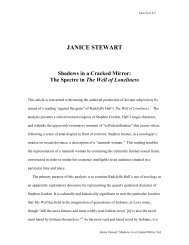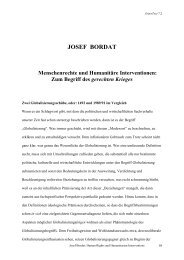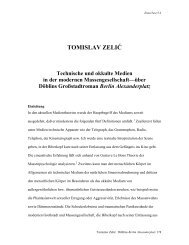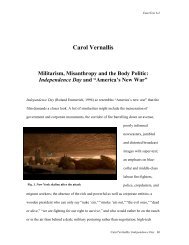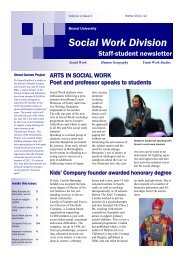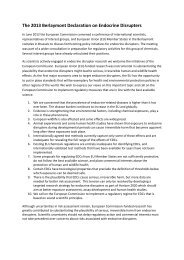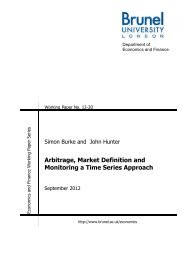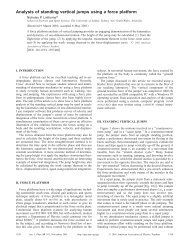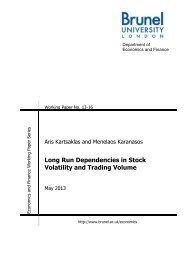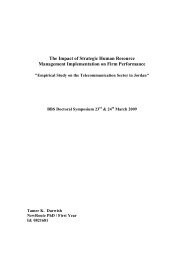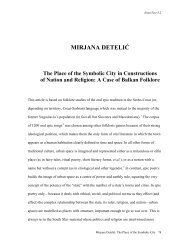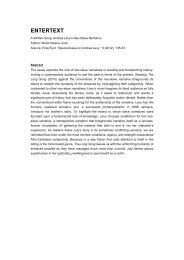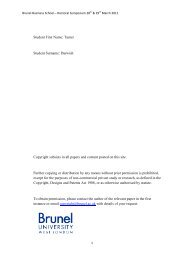Brunel's Olympic Hopefuls - Brunel University
Brunel's Olympic Hopefuls - Brunel University
Brunel's Olympic Hopefuls - Brunel University
Create successful ePaper yourself
Turn your PDF publications into a flip-book with our unique Google optimized e-Paper software.
Developing the clean cars of the future<br />
The production of significantly<br />
greener, more energy efficient<br />
vehicles in the UK is one step closer<br />
to realisation thanks to a major<br />
£4.3M research programme led by<br />
experts at <strong>Brunel</strong> <strong>University</strong>.<br />
The EPSRC – funded programme,<br />
headed by <strong>Brunel</strong>’s Professor<br />
Zhongyun Fan in conjunction with<br />
a consortium of UK universities<br />
and industrial partners, will lay<br />
the foundation for a wholly<br />
new and sustainable<br />
approach to vehicle design,<br />
manufacture and end of<br />
life recycling.<br />
Professor Fan<br />
will lead an<br />
internationally<br />
renowned team in<br />
the development<br />
of recyclable alloys<br />
and polymer<br />
composites,<br />
using advanced<br />
manufacturing<br />
and disassembly<br />
technologies, that<br />
will help to deliver<br />
new, lightweight<br />
vehicle structures for<br />
future Low Carbon<br />
Vehicles (LCVs). As well as<br />
boosting the UK automotive<br />
industry, the research will play<br />
an important role in helping the<br />
UK meet its 2030 and 2050 carbon<br />
emission reduction targets.<br />
The long-term goal is to allow<br />
a vehicle’s structure to be fully<br />
recycled at the end of its life- a<br />
process known as ‘closed loop<br />
recycling’- and the materials reused<br />
to build the next generation of<br />
low carbon vehicles. Central to<br />
the consortium’s ambitions is to<br />
create both closed loop recyclable<br />
aluminium and magnesium<br />
alloys and recyclable carbon and<br />
glass fibres for polymer matrix<br />
composites. These lower cost<br />
recyclable materials will provide<br />
the basis for the mass production of<br />
energy-efficient vehicles.<br />
Professor Fan, Director of the<br />
<strong>Brunel</strong> Centre for Advances<br />
Solidification Technology (BCAST)<br />
and a world-leading expert in<br />
light metal casting, explains how<br />
using the right materials can<br />
reap rewards when it comes to<br />
recycling: “Current manufacturing<br />
techniques and recycling methods<br />
do not fully realise the potential<br />
of the materials used. Materials<br />
are usually downgraded with each<br />
round of recycling, and are not<br />
used for the same initial<br />
purpose,<br />
and we want to develop techniques<br />
that allow materials to go back to<br />
their original applications without<br />
being downgraded.<br />
“Aluminium drinks cans are a great<br />
example of closed loop recycling.<br />
Made of high-grade aluminium<br />
alloy, recycled empty cans are<br />
collected, consolidated, melted<br />
down, and turned back into new<br />
cans without any downgrading<br />
of the aluminium alloy, and the<br />
new cans are quickly back on top<br />
shelves. We want to achieve the<br />
same type of recycling with metallic<br />
LCV structures. This will help reduce<br />
carbon emissions, use far fewer raw<br />
materials and significantly reduce<br />
waste going to landfill.”<br />
Vehicle design will also need to<br />
be modified to make use of the<br />
BRUNEL RESEARCH :: LINK MAGAZINE<br />
17<br />
novel recyclable materials and<br />
to integrate lighter structures.<br />
The research team will consider<br />
the design process for a range of<br />
vehicles, including small, efficient<br />
petrol and diesel engines and<br />
engines that use full electric<br />
propulsion, to ensure that the<br />
process for dismantling end of life<br />
vehicles will be engineered into<br />
early stages of vehicle design.<br />
While the project is likely<br />
to give the UK’s car<br />
manufacturing industry<br />
(currently worth £10<br />
billion a year to the<br />
economy) a significant<br />
advantage over<br />
its international<br />
competitors, the<br />
biggest beneficiary<br />
od the research will<br />
undoubtedly be<br />
the environment.<br />
By making vehicles<br />
lighter weight and<br />
easier to recycle,<br />
the programme will<br />
play an instrumental<br />
part in reducing<br />
the CO 2 emissions<br />
of UK road transport<br />
and in the material and<br />
vehicle manufacturing<br />
process, as well as in reducing<br />
the amount of waste sent to<br />
landfill. Professor Fan explains:<br />
“There is a very simple relation<br />
between vehicle weight and carbon<br />
emissions. A 1,000kg vehicle will<br />
have a carbon emission of 100g/<br />
km whereas a 500kg vehicle will<br />
only emit 50g CO 2 /km driven.<br />
Halving vehicle weight effectively<br />
halves carbon emission for<br />
properly designed vehicles with<br />
conventional engines. For electric<br />
vehicles the weight reduction<br />
dramatically extends vehicle range<br />
and reduces battery cost, as a<br />
smaller battery can be used.”<br />
However, such fundamental-level<br />
research cannot deliver results<br />
immediately. As the automotive<br />
industry begins to adopt the<br />
outcomes of the project, the<br />
benefits will be felt over the<br />
next 20 years. The project will<br />
help the UK meet its target of a<br />
6% reduction in transport CO 2<br />
emissions by 2030.



